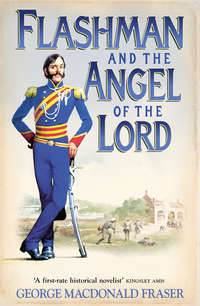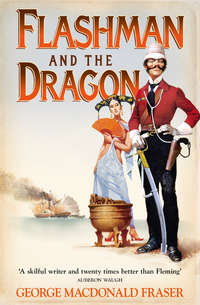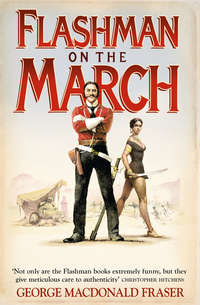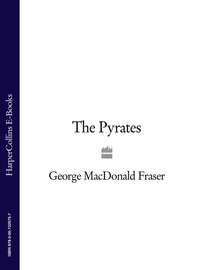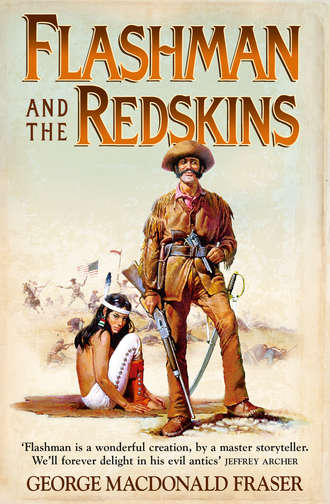
Полная версия
Flashman and the Redskins
Look at the map again – and remember that beyond Westport there was no such thing as a road. There were two trails, to all intents, and they were just wagon-tracks – the Santa Fe and the Oregon. You didn’t think of roads then; you thought of rivers, and passes. Arkansas, Cimarron, Del Norte, Platte, Picketwire, Colorado, Canadian – those were the magic river names; Glorieta, Raton, South Pass – those were the passes. There were no settlements worth a dam, even – Santa Fe was a town, sure enough, if you ever got there, and after that you had nothing until San Diego and Frisco and the rest of the cities of the west coast. But in between, the best you could hope for were a few scattered forts and trading posts: Bent’s, Taos, Laramie, Bridger, St Vrain, and a few more. Hell’s bells, I rode across Denver when the damned place wasn’t even there.
No, it was the unknown then, to us at least; millions of square miles of emptiness which would have been hard enough to cross even if it had truly been empty, what with dust-storms, drought, floods, fire, mountains, snow-drifts that could be seventy feet deep, cyclones, and the like. But it wasn’t empty, of course; there were several thousand well-established inhabitants – named Cheyenne, Kiowa, Ute, Sioux, Navajo, Pawnee, Shoshoni, Blackfeet, Cumanche … and Apache. Especially, Apache. But even they were hardly even names to us, and the belief – I give you only my own impression – in the East was that their nuisance had been greatly exaggerated.
So you see, we started in fairly blissful ignorance, but before we do, take one last look at the map before Professor Flashy endeth the lesson. See the Arkansas River and the Rockies? Until the 1840s, they had been virtually the western and south-western limits of the U.S.A.; then came the war with Mexico, and the Yankees won the whole shooting-match that they own today. So when we jumped off for California, we were heading into country three-quarters of which had been Mexican until a few months before, and still was in everything but name.10 Some of it was called Indian Territory, and that was no lie, either.
That was what lay ahead of us, gullible asses that we were, and if you think it was tough you should have seen the Comber caravan loading up in the meadow at Westport. I’ve squared away, and ridden herd upon, most kind of convoys in my time, but shipping a brothel was a new one on me. Visiting ’em in situ, you don’t realise how elaborately furnished they are; when I saw the pile of gear that had come ashore off the steamboat, I didn’t credit it; a stevedore would have taken to drink.
For one thing, the sluts all had their dressing-tables and mirrors and wardrobes, stuffed with silks and satins and gowns and underclothes and hats and stockings and shoes and garters and ribbons and jewellery and cosmetics and wigs and masks and gloves and God knows what beside – there were several enormous chests which Susie called ‘equipment’, and which, if they’d burst open in public, would have led to the intervention of the police. Gauzy trousers and silk whips were the least of it; there was even a red plush swing and an ‘electrical mattress’, so help me.
‘Susie,’ says I, ‘I ain’t old enough to take responsibility for this cargo. Dear God, Caligula wouldn’t know what to do with it! You’ve had some damned odd customers in Orleans, haven’t you?’
‘We won’t be able to buy it in Sacramento,’ says she.
‘You couldn’t buy it in Babylon!’ says I. ‘See here; two of the wagons must be given over to food – we need enough flour, tea, dried fruit, beans, corn, sugar, and all the rest of it to feed forty folk for three months – at this rate we’ll finish up eating lace drawers and frilly corsets!’ She told me not to be indelicate, and it would all have to go aboard; she wasn’t running an establishment that wasn’t altogether tip-top. So in went the fancy bed-linen and tasselled curtains and carpets and chairs and chaise-longues and hip-baths, and the piano with candlesticks and a case of music – oh, yes, and four chandeliers and crystal lampshades and incense and bath salts and perfumes and snuff and cigars and forty cases of burgundy (I told the demented bitch it wouldn’t travel) and oil paintings of an indecent nature in gilt frames and sealed boxes of cheese and rahat lakoum and soap and pomade, and to crown all, a box of opium – with Cleonie’s parrot in its cage to top everything off. In the end we had to hire two extra wagons.
‘It’s worth it,’ says Susie to my protests. ‘It’s all investment, darlin’, an’ we’ll reap the benefit, you’ll see.’
‘Provided the gold-fields are manned entirely by decadent Frog poets, we’ll make a bloody fortune,’ says I. ‘Thank God we shan’t have to go through Customs.’
The whores were another anxiety, for while Susie had them thoroughly chastened, and kept them dressed like charity girls, they wouldn’t have fooled an infant. They were all coloured, and stunners, and they didn’t walk, or even sit, like nuns, exactly. You just had to look at the stately black Aphrodite, regarding herself in a hand-mirror while the pert creamy Claudia dressed her hair, or Josephine perched languidly on a box, contemplating her shapely little feet with satisfaction, or Medea and Cleonie sauntering among the wildflowers with their parasols, or the voluptuous Eugenie reclining in a wagon, sultry-eyed and toying with her fan – no, you could tell they weren’t choir-girls. I took one look at the score of drivers and guards that Owens had hired for us, and concluded that we’d have been a sight safer carrying gold bullion.
They were decent men enough, as hard cases go, half of them bearded buckskineers, a few in faded Army blues, and all well-mounted and armed to the teeth with revolving pistols and rifles. Their top spark was a rangy, well-knit Ulsterman with sandy whiskers and a soft-spoken honey-comb voice; his name, he informed me, was Grattan Nugent-Hare, ‘with the hyphen, sir – which is a bit of a pose, don’t ye know, but I’m attached to it.’ There was a dark patch on his sleeve where chevrons had been; when he dismounted, it was like a seal sliding off a rock. Gentleman-ranker, thinks I, bog-Irish gentry, village school, seen inside Dublin Castle, no doubt, but no rhino for a commission. A very easy, likely lad, with a lazy smile and a long nose.
‘You were with Kearny,’ says I. ‘And before that?’
‘Tenth Hussars,’ says he, and I couldn’t help exclaiming: ‘Chainy Tenth!’ at which he opened his sleepy eyes a little wider. I could have bitten my fool tongue out.
‘Why, so it was. And you’re a naval gentleman, they tell me, Mr Comber – your pardon … captain, I should say.’ He nodded amiably. ‘Well, well – d’ye know, I’d ha’ put you down for cavalry yourself, by the set of the whiskers? I’d ha’ been adrift there, though, right enough.’
It gave me a turn; this was a sharp one. The last thing I wanted just then was an old British Army acquaintance – but I’d never known the Tenth except by name, which was a relief.
‘And how far west did you go with Kearny?’ I asked.
‘Gila River, thereabout … that was after Santa Fe, d’ye see? So it’s not new country to me, altogether. But I apprehend you’re all the way for California – with the ladies.’ And he glanced past me to where Susie was chivvying the tarts out of sight into the wagons. He grinned. ‘My stars, but they’re as bonny as fluffy little doe rabbits on the green, so they are.’
‘And that’s the way they’ll stay, Mr Nugent-Hare—’
‘Call me Grattan,’ says he, and grinned as he patted his pony’s muzzle. ‘I’m up the road ahead of you, Mr Comber. You were about to say, I think, that after a few weeks those boys of mine might feel the fever, and those charming little maids – if ye’ll forgive the term – would prove a temptation? Not at all, at all. They’ll be as safe as if they were in St Ursula’s.’ He tilted his hat back, not smiling now. ‘Believe me, if I didn’t know how to manage rascals like these – I wouldn’t be here, would I now?’
He was a cocksure one, this – but probably, I reflected, not without cause; the Army had left its stamp on him, all right. I reminded him that military discipline was one thing, and these were civilians, out on the plains.
He laughed pleasantly. ‘Military discipline be damned,’ says he. ‘It’s simple as shelling peas. If one of ’em so much as tips his tile to your young ladies, I’ll blow the bastard’s head off. And now, sir … the order of march … what would ye say to a point rider, a rearguard, two to a flank, and myself riding loose? If that would be agreeable … And you’ll be riding herd yourself? Quite so …’
If his nose hadn’t been quite so long, and his smile so open, it would have been a pleasure to do business with him. Still, he knew his work, and he was being well paid; captain or no captain, it struck me I might spend most of the trip lounging in the carriage after all.
However, when the great moment of starting came I was in the saddle, in full buckskin fig, for one has to show willing. With Wootton silent alongside, I led the way down the meadow and into the trees, and after us trundled the carriage, with Susie fanning herself like Cleopatra, and her nigger maid and cook perched behind, and then the eight big schooners, flanked by Nugent-Hare’s riders; their canvas covers were rolled up like furled sails in the spring sunshine, with the tarts sitting primly two by two; in the rear came the mules, with a couple of Mexican savaneros, the three-hundred-pound loads piled incredibly high and swaying perilously. It was a well-rutted trail, and the schooners rolled now and then, which caused some flutter and squeak among the girls, but I noticed that the guards – who might have taken the opportunity to render gallant assistance – barely glanced in their direction; perhaps Grattan was as strong a straw-boss as he made out, after all.
Once through the timber, we came out on the prairie itself, all bright with the early summer flowers, and I galloped ahead to a little hillock for a look-see. That’s a moment I remember still: behind lay the woods with the smoke haze rising from Westport; left and right, and as far ahead as the eye could see, was limitless rolling plain, dotted with clumps of oaks and bushes, the grass blowing gently in the breeze, and fleecy clouds against a blue sky that seemed to stretch forever. Below, the wagons crawled along the trail, its furrows running clear and straight to the far horizon, where you could just see the last wagon of the caravan ahead. And I absolutely laughed aloud – why, I can’t tell, except that in that moment I felt free and contented and full of hope, with my spirits bubbling as high as they’ve ever done in my life. Others, I know, have felt the same thing about starting on the trail west; there’s an exhilaration, a sense of leaving the old, ugly world behind, and that there’s something splendid waiting for you to go and find it, far out yonder. I wonder if I’d feel it now, or if it happens only when you’re young, and have no thought for the ill things that may lie along the way.
For it’s an illusion, you know – the start of the trail. Those first ten days lull you to sleep, as you roll gently down over that changeless plain, through the well-used camp-places to Council Grove, which is the great assembly point where little caravans like ours form themselves into regular wagon-trains for the long haul to the mountains – there! I’m writing in the present tense, as though it were all in front of me again. Well, it ain’t, thank God.
But it soon becomes dull; the only notable thing happened about the third day, when we came to a little stream and copse where there was a fairish assembly of wagons, and the trail divided – our fork continuing south-west, while the northern trail branched up towards the Kansas River, and then to the North Platte, and eventually to Oregon. As we were breaking camp, with several other California-bound parties, the Oregon folk were already setting out, and there was great badinage and cheering and singing as they got under way.
They were a serious lot, those Oregoners, being mostly farm folk intent on honest work – not like us California scamps off to the gold-fields. We were a raffish crew, but they were sober men and grim women, with never a tin pan or a rope out of place, everything lashed down hard and the kids peeping solemnly over the tailboards. They had an American flag on their lead wagon, and their captain was a bearded Nemesis in a tail coat, his harsh voice echoing down the mule lines: ‘One train, are ye set? Two train, are ye set?’ and every arriero sang out in turn, ‘All set! All set!’, which was the signal to go, for you don’t loaf about with a laden mule, and you don’t stop for a noon halt, either, or the brute will never start off again. So now it was ‘All set!’ and the whips cracked and the skinners yelled and the wheels groaned, and the great train rolled away and the mules plodded forward with their bells jingling, and all the California people yelled and waved their hats and hurrawed and fluttered their handkerchiefs and cried: ‘Good luck! Oregon or bust! Take care, and God bless you!’ and the like, and the Oregon folk waved back and began to sing a song that I’ve forgotten now, except that it went to the tune of ‘Greensleeves’ and was all about how the Lord would have a land of milk and honey flowing for His children, over there – and the women from the California wagons began to cry, and some of them hurried after the Oregoners, with their aprons kilted up, offering ’em last gifts of pies and cakes, and the children went scampering along after the wagons, whooping and cheering, except for the little ones, who stood with their fingers in their mouths staring at an old minister who sat astride a mule beside the trail and blessed the Oregon people, with his Bible held above his head. And the caravan wound over the ridge and out of sight, and there was a sudden stillness in the camp-site under the trees, and then someone said, well, better git started ourselves; come on, mother …
And they cheered up, for they were a jolly, carefree lot that went to California that year, with their wagons piled any old how with all sorts of rubbish that they thought might prove useful at the diggings, like patent tents and mackintosh boats (‘Gold-seekers, take heed! Our rubber boats and shelters are unsurpassed!! You cannot face the chill of the gold rivers without a rubber suit!!!’) and water-purifiers and amazingly fangled machinery for washing gold dust. And they didn’t sing any hymns about milk and honey and Canaan, either; no, sir, it was a very different anthem, plunked out on a banjo by a young chap in a striped vest, with his girl dancing impromptu on a packing-case, and everyone thumping the tailboards – I daresay you know the tune well enough, although it was new then, but I’ll be bound you don’t know the words the Forty-Niners sang:
I’ll scrape the mountains clean, my boys,
I’ll drain the rivers dry,
A pocketful of rocks bring home,
Susannah, don’t you cry!
Oh, Californey!
That’s the land for me,
I’m off to Sacramento
With my wash-bowl on my knee!
(omnes, fortissimo)
Oh, Susannah, don’t you cry for me,
I’m off to Sacramento
With my wash-bowl on my knee!
It was a raucous, ranting thing, but when I hear it now in imagination it’s just a ghostly drift down the wind, fading into a whisper. But it was hearty enough then, and we sang it all the way down to Council Grove.
I promised not to do a Gregg or Parkman, but I ought to tell you something of how we travelled.11 When we camped at night, we set guards; Wootton insisted, but I was all for it anyway, for you must do things right from the start. Susie and I slept in the carriage, which was as comfortable as Owens had promised, and the tarts slept in two of the wagons close at hand. The drivers and guards had a couple of tents, although some preferred to doss down in the open. At breakfast and supper, and at the noon halt, Susie and I were waited on by her nigger servant, the tarts ate in their own wagons, and the guards messed at a discreet distance – oh, we were a proper little democracy, I can tell you. I suggested that we might have Grattan over for supper one night, since he was a bit of a gentleman, or had been, but Susie wouldn’t hear of it.
‘They’re our work-folk,’ says she, holding a chicken leg with her pinkie cocked, and guzzling down the burgundy (now I saw why we’d brought such an unconscionable lot of it). ‘If we encourage familiarity, they’ll just presume, an’ you know where that leads – you finish up ’avin’ to call in the militia to put ’em in their place, like New York.12 Anyway, that Nugent-Thingummy looks a right sly smart alec to me; whatever ’e may say about lookin’ after my wenches, an’ keepin’ them randy guards at arm’s length, I’m glad I’ve got Marie an’ Stephanie on the cue vee.’
‘What’s this?’ says I, for I took a fatherly interest in the welfare of our fair charges.
‘Marie an’ Stephanie,’ says Susie, ‘would rat on their own mothers, an’ the other little trollops know it. So there’ll be no ’anky-panky – or if there is, I’ll soon ’ear of it. An’ Gawd ’elp the backslider; she won’t be able to sit down between ’ere an’ Sacramento, I promise you that.’
So two of the tarts were Susie’s pet spies, were they? That was useful to know – and lucky I’d found out before I’d done anything indiscreet. I could foresee circumstances where that knowledge might be useful.
One acquaintance that I did cultivate, though, on the quiet trek to Council Grove, was Uncle Dick Wootton. He was a strange case; after our first meeting he’d hardly said a word to me for days, and I wondered was he sulking, but I soon discovered it was just a pensive shyness; he kept very much to himself with new acquaintances, although he could be genial and even garrulous when he got to know you. He was younger than I’d thought, and quite presentable when he’d shaved. However, down to Council Grove he had no proper duties anyway; Grattan and I set the guards, and halts and starts seemed to determine themselves; when anything out of the way happened, like a river-crossing, the teamsters and guards saw to it, and since there were good fords and the weather was dry, all went smoothly enough.
So Wootton had no guiding to do, and he spent the time riding far out to flank, or some way ahead; he had a habit of vanishing for hours at a time, and once or twice I know he slipped out of camp at dusk only to reappear at dawn. He ate all on his own, looking out across the prairie with his back to camp; sometimes he would sit on a hill for hours at a time, looking about him, or wander silent round the wagons, checking a wheel or examining the mule-loads. I would catch his eye on me, occasionally, but he would turn aside and go off again, humming quietly to himself, for another prowl over the prairie.
Then one day just after a noon halt he trotted up to me and said: ‘Buffler, cap’n’, and I rode out with him a couple of miles to where a small herd of the beasts were grazing – the first I’d ever seen. I was for taking a shot at once, but he bade me hold on.
‘Got to pick a tender cow. Bull meat tough enough to build a shack, this time o’ summer. Now, see thar; you take a sight a half finger width down from the hump, an’ a finger from the nose, or she’ll cairry your lead away for ye. Gotta hit hyart or lungs. Now, cap’n; you blaze away.’
So I did, and the cow took off like a rocket, and ran quarter of a mile before she suddenly tumbled over, stone dead. ‘Gone under,’ says Wootton. ‘You shoot sweet’, and as he skinned the hump very expertly, and removed the choicest meat, he explained to me that a buffalo was damnably hard to kill, unless you hit it in a vital spot; I gathered I had gone up in his estimation.
I thought we would drag the carcase back to the caravan, but he shook his head, and set to roasting hump steaks over a fire. I’ve never tasted meat like that first buffalo-hump; there’s no beef to compare to it, and you can eat it without bread or vegetable, so delicious it is. Wootton also removed the intestines, and to my disgust grilled them gently by pulling them through the embers, whereafter he swallowed them in a great long string, like some huge piece of spaghetti. I watched him in horror – or rather, I didn’t watch him, for I couldn’t bear the grisly spectacle. Instead, I turned my head aside, and saw something infinitely worse.
Not twenty yards away, on the lip of a little grassy ridge looking down on the hollow where we’d built our fire, three Indians were sitting their ponies, watching us. I hadn’t heard them or had the least intimation of their approach; suddenly, there they were – and I realised that the wretched dirty creatures I’d seen at Westport, and scavenging round our train on the way down, were mere cartoon. These were the real thing, and my heart froze. The foremost was naked to the waist, with braided hair hanging to his belt, and what looked like a tail of coonskin round his brows; the face beneath it was a nightmare of hooked nose and rat-trap mouth crossed by stripes of yellow paint. There were painted signs on his naked chest, and his only clothing was a white breech-clout and fringed leggings that came to his knees. He had a rifle across his saddle and carried a long lance tufted with buffalo hair – at least, I hoped it was buffalo hair. The other two were no better; they had feathers in their hair, and their faces were painted half red and white; they carried bows and hatchets, and like their leader they were big, active, vicious-looking sons-of-bitches. But what truly scared me stiff was their sudden apparition, and the silent dreadful menace in the still figures as they watched.
I suppose it took me a couple of seconds to recover – but as my hand went to my pistol Wootton’s fingers closed on my wrist.
‘Set froze, cap’n,’ says he softly. ‘Brulé Sioux. Friendly … kind of.’
A fine reassurance, but Wootton seemed untroubled – you’ll notice that even with his back turned he knew they were there, and what they were. Now he turned his head and called to them, and after a moment they dismounted and came slowly down to us. They looked even wickeder at close quarters, but they squatted down, and the leader raised a hand to Wootton and grunted something that sounded like a mortal insult, but was presumably a greeting. Wootton responded, while I sat stone still and kept my hand close to my pistol-butt, nonchalant-like – which ain’t easy with the fiend incarnate hunkered down a yard away, glaring with basilisk eyes out of a mask of paint, and you’re uncomfortably aware that he’s a muscular six feet of oiled and smelly savagery, with a hatchet like a polished razor on his hip.
He and Wootton grunted some more at each other, and presently Wootton introduced us. ‘This hyar Spotted Tail,’ says he. ‘Big brave.’ How-de-do, says I, and to my surprise he shook hands, and made a noise between a snarl and a belch which I took for civility. While he and Wootton talked, I studied the other two – if I’d known that the red dots on their feathers signified enemies killed, and the notches stood for cut throats, I’d have been even uneasier than I was. For that matter, Spotted Tail himself had five eagle feathers slanted through his pigtail; each one, I learned later, stood for a scalp taken.13
Wootton was plainly asking questions, and the Indian answered with his slow grunts, accompanied by much deliberate gesture – mighty graceful it was, too, and expressive. Even I could tell when he was talking of buffalo, just by the rippling motion of his hand, so like a bison herd seen from far off; a gesture which I noticed he repeated more than once was a quick cutting motion with his right fingers across his left wrist, which I later learned meant ‘Cheyenne’, whose nickname is ‘Cut Arms’.14 Then Wootton invited them to join him in his awful mess of buffalo guts, and much to the amusement of the other two, he and Spotted Tail had a nauseating contest in which each took an end of an immensely long intestine and gobbled away to see who could down the most of it. The Indian won – I spare you a close description, observing only that they swallowed whole, without chewing, and Spotted Tail, by suddenly jerking his head back, regained a fair amount that Wootton had already eaten!15




